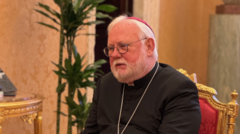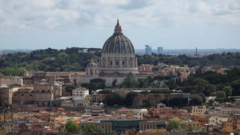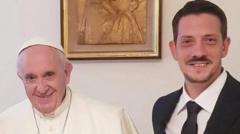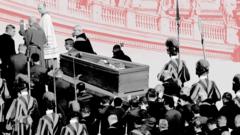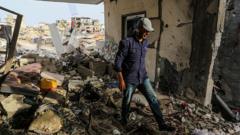The Israeli government's reaction to the passing of Pope Francis has raised eyebrows, marked by delayed condolences and a minimal representation at the pontiff's funeral. The state’s response is viewed as indicative of broader tensions related to the ongoing conflict in Gaza.
Muted Israeli Response to Pope Francis's Death Reflects Gaza Tensions

Muted Israeli Response to Pope Francis's Death Reflects Gaza Tensions
Israeli Prime Minister's condolences, delayed acknowledgments, and a minimal delegation highlight diplomatic strains over Gaza.
The Israeli Prime Minister’s office finally expressed condolences for Pope Francis four days posthumously, a move perceived as tepid. Initially, a more heartfelt message was conveyed via social media but was swiftly deleted, stirring controversy within Israel regarding its implications. Critics highlight this deletion as indicative of the Israeli administration's annoyance with the Pope's outspoken remarks regarding Gaza.
The official statement from the Prime Minister’s office, devoid of warmth, merely stated, "The State of Israel expresses its deepest condolences." This comes after the earlier social media post, featuring an image of Pope Francis at the Western Wall, was dismissed, with officials calling it an error. Notably, Israeli media pointed out that the prior mention of condolences was deleted without explanation.
Israeli ambassador to the Vatican, Yaron Sideman, is set to represent Israel at the funeral, contrasting sharply with the attendance of world leaders such as US President Donald Trump. This level of representation was also a stark departure from the 2005 funeral of Pope John Paul II, where Israeli heads of state attended.
President Isaac Herzog offered a heartfelt tribute soon after the Pope's passing, praising his compassion and faith. Yet, he will not be attending the funeral, with speculations that the scheduling on Shabbat—a Jewish day of rest—might be a contributing factor.
Critics within Israel view this muted response as a sign of ongoing resentment over Pope Francis’s vocal support for Palestinians during the conflict. In prior comments, the Pope had called for an investigation into whether Israel’s military actions constitute genocide, warrants denied by Israel, and described Gaza’s humanitarian situation as “shameful.” His otherwise balanced approach did not shield him from being perceived as biased by the current Israeli government coalition.
Meanwhile, the Palestinian Authority plans to send Prime Minister Mohammad Mustafa to the funeral, citing respect for the late Pope’s gestures of empathy during hostilities. This diplomatic divergence may highlight deeper rifts in the Israeli-Vatican relationship, observable during the upcoming ceremony in Rome.
The official statement from the Prime Minister’s office, devoid of warmth, merely stated, "The State of Israel expresses its deepest condolences." This comes after the earlier social media post, featuring an image of Pope Francis at the Western Wall, was dismissed, with officials calling it an error. Notably, Israeli media pointed out that the prior mention of condolences was deleted without explanation.
Israeli ambassador to the Vatican, Yaron Sideman, is set to represent Israel at the funeral, contrasting sharply with the attendance of world leaders such as US President Donald Trump. This level of representation was also a stark departure from the 2005 funeral of Pope John Paul II, where Israeli heads of state attended.
President Isaac Herzog offered a heartfelt tribute soon after the Pope's passing, praising his compassion and faith. Yet, he will not be attending the funeral, with speculations that the scheduling on Shabbat—a Jewish day of rest—might be a contributing factor.
Critics within Israel view this muted response as a sign of ongoing resentment over Pope Francis’s vocal support for Palestinians during the conflict. In prior comments, the Pope had called for an investigation into whether Israel’s military actions constitute genocide, warrants denied by Israel, and described Gaza’s humanitarian situation as “shameful.” His otherwise balanced approach did not shield him from being perceived as biased by the current Israeli government coalition.
Meanwhile, the Palestinian Authority plans to send Prime Minister Mohammad Mustafa to the funeral, citing respect for the late Pope’s gestures of empathy during hostilities. This diplomatic divergence may highlight deeper rifts in the Israeli-Vatican relationship, observable during the upcoming ceremony in Rome.

